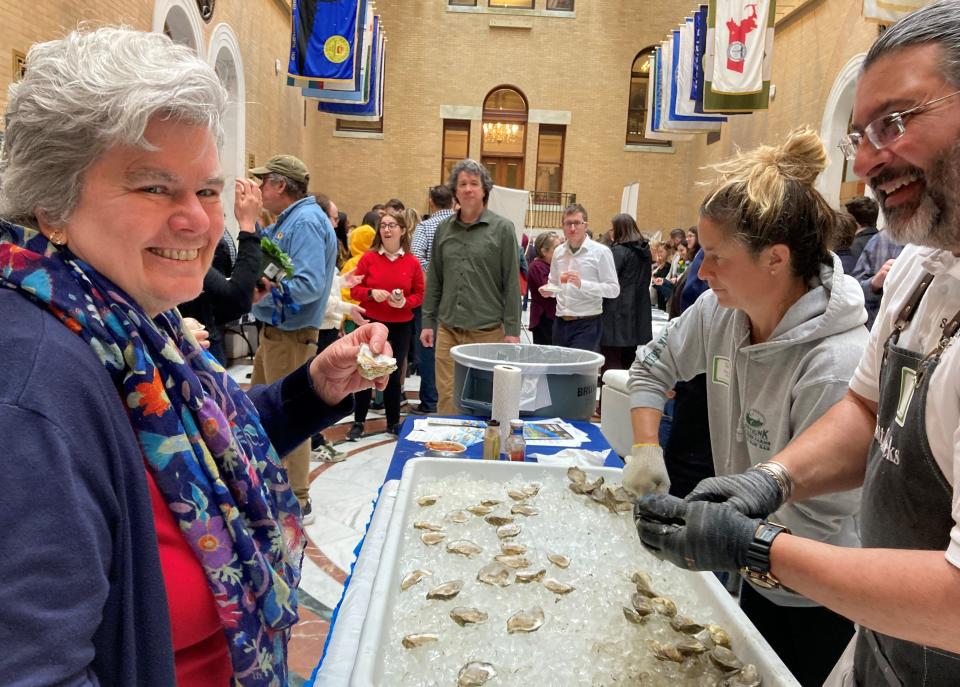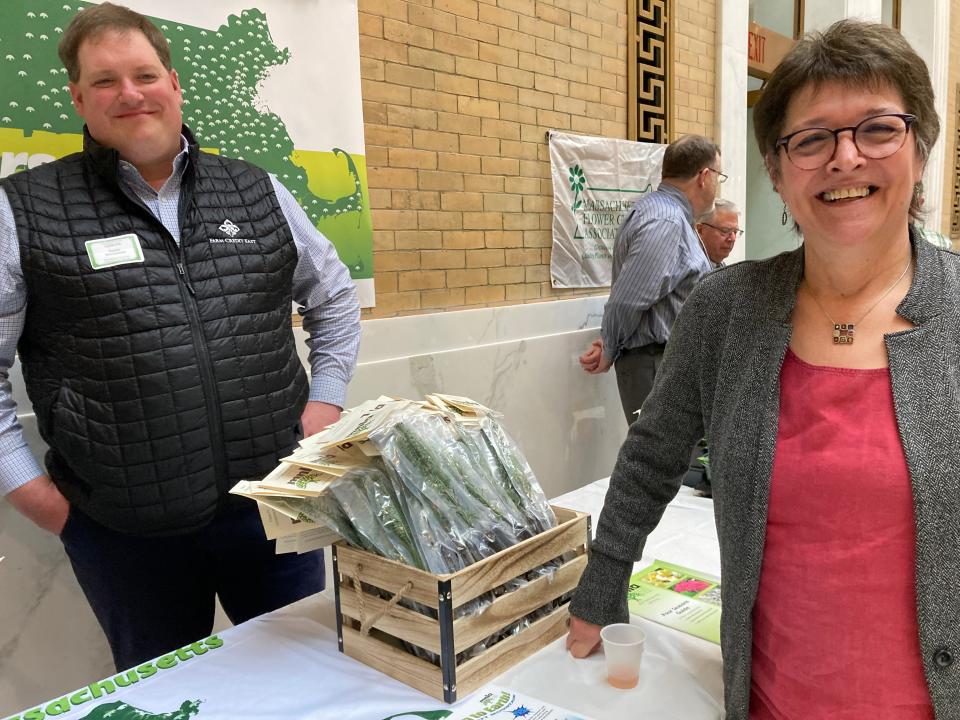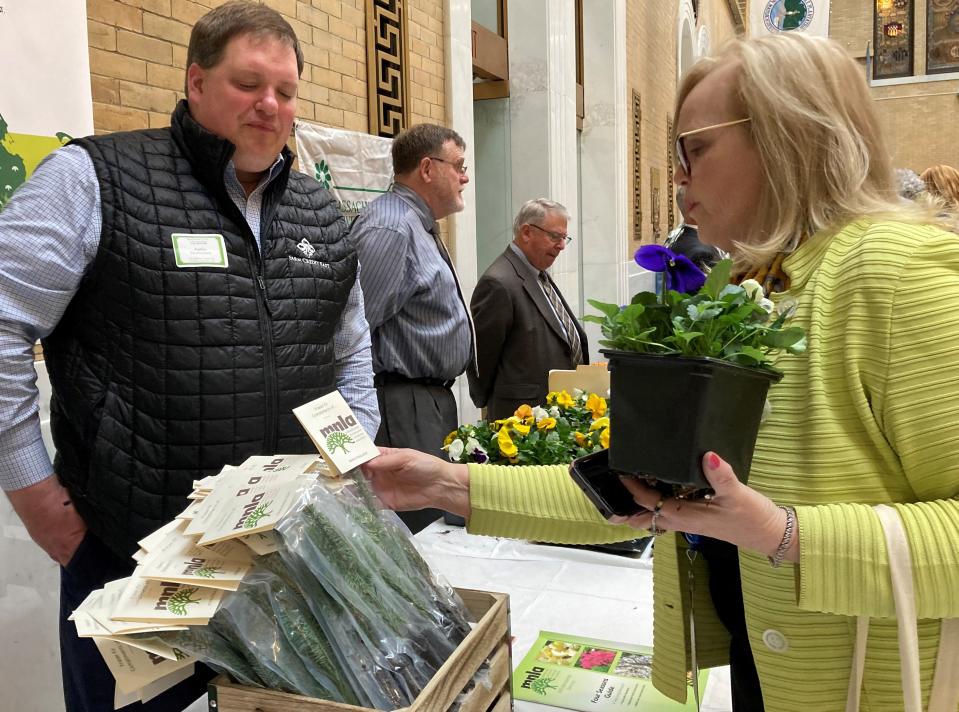Field day for agriculture sector with farmers showcasing wares at State House
- Oops!Something went wrong.Please try again later.
BOSTON — New Jersey may be the Garden State, but the agriculture base of the Bay State and its importance to the Massachusetts economy was highlighted at Agriculture Day, an annual event held each spring at the State House.

From honey and oysters to cheese to ice cream, farmers and growers from across the state showcased their wares in the Hall of Flags. Ag-Day also gives legislators and members of the legislative food caucus an opportunity to highlight work accomplished and bills still pending.
The Massachusetts agricultural industry adds $500 million to the state's economy and represents 1% of the state's GDP, according to the University of Arkansas Division of Agriculture.
Members of the food caucus touted two major accomplishments: The funding of universal school meals through the yearly budgeting process and allocating $20 million to a disaster fund after climate issues throughout the year devastated sectors of the state’s agriculture industry.
“This year, 100,000 more (public school) children are eating school meals,” said Rep. Andres Vargas, D-Haverhill, a member of the food caucus. The legislation was championed by Vargas and Sen. Sal DiDomenico, D-Everett. “We take pride that food is an essential component of the school day; no child will go hungry at school.”
Sen. Bruce Tarr, R-Gloucester, touted the bicameral and bipartisan work to send financial help to farmers hit hard by weather disasters last year — a deep freeze in February, frosts in May and torrential rain storms that washed out field crops throughout the summer and fall.
“Last year saw great weather events,” Tarr said, events that many growers had difficulty overcoming. Orchards lacked fruit, crops were washed away and the soil was saturated to the point of being unworkable. “The facts are simple: Farmers support Massachusetts residents and it is appropriate for the Legislature to support the farmers.”
Pending but advancing through the process were bills that address food security, food independence and the future of agriculture in Massachusetts. These include:
A state law that makes universal school meals permanent and not subject to budgetary fluctuations
A bill that would support and strengthen local food systems; it would establish a state food system coordinator and offer training to new farmers
Codifying into law the state’s Healthy Initiatives Program, which matches SNAP benefits dollar-for-dollar to purchase locally grown products at farmers markets and farm stands
A bill that would support diversification of farm use, allowing agriculture-related uses of designated farmland and agritourism for periods longer than five years
A Hunger-Free Campus initiative to ensure all learners have access to nutritious food
“This is an exciting day to be here,” Vargas said as he welcomed legislators, the state’s farmers and future farmers including students participating in 4-H programs and similar organizations.
“Food access, feeding our people, is a critical issue in the commonwealth,” Vargas said, calling it an intersectional issue that crosses with health, poverty, climate change and the economy. Ensuring the affordable supply of nutritious, healthy food is key to alleviating food insecurity in the state.
The speakers discussed proposed legislation including an agricultural omnibus bill that would address the future of farming in Massachusetts. It would allow the Massachusetts Department of Agricultural Resources to purchase farmland, create ways to guide farmers in person and establish plans to accommodate food chain supply disruptions. It would also encourage food donations from farms and businesses to nonprofit distributors, improve programing at the state‘s agricultural high schools and extend community garden programs and farmers markets throughout the state.
Food, products highlight of event
But the real attraction of Ag-Day is the food.

The event showcased oysters from Duxbury, Padanaram and Cuttyhunk, goat cheese from dairies in the Berkshires and lavender from farms on the Cape. The Massachusetts Nursery & Landscape Association was distributing pots of pansies and fir trees to plant. Central Mass. Grown, which supports local farmers in and around Worcester County, gave out maps that indicated the location of locally grown food, farms and farmers markets.
According to the map, there are 1,568 farms in Worcester County, 40 producers of maple syrup and 163 orchards producing fruit, 86 farms producing blueberries and 100,000 chickens laying eggs.
Rep. Kate Donaghue, D-Westborough, stepped outside of Central Massachusetts to sample a specialty from a different section of the state: oysters.
Scott Soares, who purchased his oyster farm with his mother, Mary Sylvia Reardon, at the end of 2021 in Padanaram and harvests out of Buzzards Bay, was at the State House shucking along side 2Rock Oyster Farm in Duxbury and Charmaine Gahan of Cuttyhunk Shellfish Farms.
“It’s a great industry,” Soares said. “Being on the water energizes me.”

With degrees in biology and marine biology, Soares works at the U.S. Department of Agriculture Rural Development while also working on his farm. The $30 million industry helps improve the clarity and quality of the water.
He started selling oysters immediately after his purchase. Now he sells those that he seeded in 2023 and will have 2024 oysters before the end of the year.
This article originally appeared on Telegram & Gazette: MA agricultural sector: small farms but big economic impact

